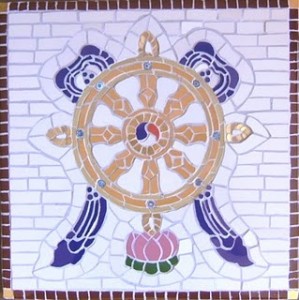An excerpt from a teaching called The Eightfold Path by Jetsunma Ahkon Lhamo
The Buddha taught that the end of suffering is possible. That’s very important. Many times in our society, we go to church, make lots of prayers, do what is required in our respective religions, but perhaps we have never been told that there is an end to suffering, and there is something that we can do rather than just wait on the rapture. There is something that we can do to pacify our suffering, purify our karma, get relief, and begin to dispel desire, attachment, and its hold on us.
The Buddha taught that the cessation of suffering is the Eightfold Path. The Buddha teaches that by following the Eightfold Path we will move towards nirvana. If we follow it diligently and accomplish it diligently, we will pacify suffering, and achieve nirvana.
I feel that no matter where you go in Dharma, you must understand the Four Noble Truths and the Eightfold Path. Without understanding these, there is no result. Even if you are doing the highest levels of Vajrayana, you must understand these fundamental teachings. So, what is this magical Eightfold Path?
The Noble Eightfold path is: (click on the links below to learn more)
- Right View
- Right Intention
- Right Speech
- Right Action
- Right Livelihood
- Right Effort
- Right Mindfulness
- Right Concentration
Sometimes if you look in a book, it may use a slightly different word. It’s just because the original language was translated slightly differently, but this is the right stuff.
The Eightfold Path is basically divided into three sections. The first section is wisdom, the second is ethical conduct, and the third is mental development. All of these must happen at the same time, and so it is essential to understand all of the Eightfold Path, and not simply rely on one angle and think you’ve really got it.
In the wisdom section there is right view and right intention. In the ethical conduct section there is right speech, right action, and right livelihood. In the mental development section there is right effort, right mindfulness, and right concentration. The wisdom section explains how to apply right thinking and gain wisdom. The ethical conduct section shows how to construct an ethical way in which to gain merit and do no harm. The mental development section is the actual meat and bones of the path.
We should never think of the Eightfold Path as a sequential, linear path. It isn’t that first you do right view, and then you go for right intention, and then you go for number three – right speech. It isn’t like that. It must be considered like the petals of a lotus in the sense that it is all one flower, and it opens up together. It should be thought of as interdependent because it gives rise to an interdependent method and it helps one to understand the many different factors of the path in a concise way.
This level of the Buddhist practice does not lead to enlightenment in one life. It takes lifetime after lifetime of consistent practice of the Eightfold Path in order to achieve some realization. So, that’s the slow route. Mahayana is a bit quicker, and Vajrayana is the one method in which you can achieve realization in one lifetime or at the time of death. We want liberation in one lifetime, but in order to do that you must train your mind according to the Eightfold Path. There is no doubt that this is the foundation of the Buddha’s teaching, and by itself will produce tremendous result.
© Jetsunma Ahkon Lhamo

